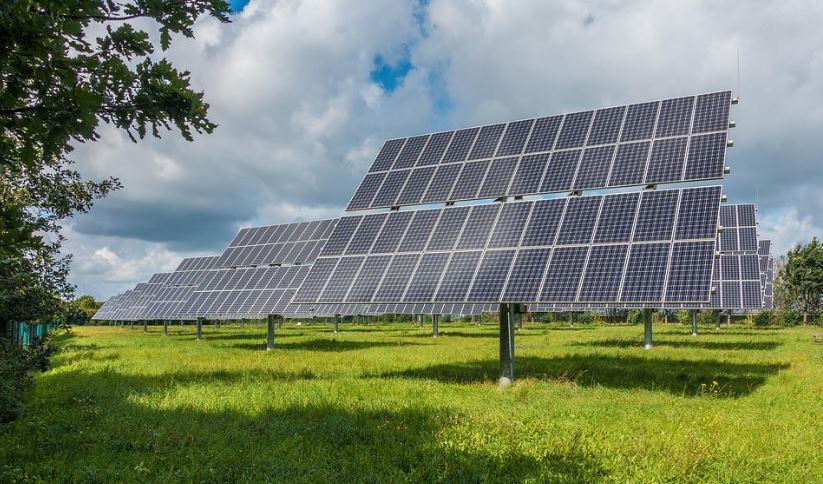The Best Battery and Solar Solutions for Off-Grid Communication Devices
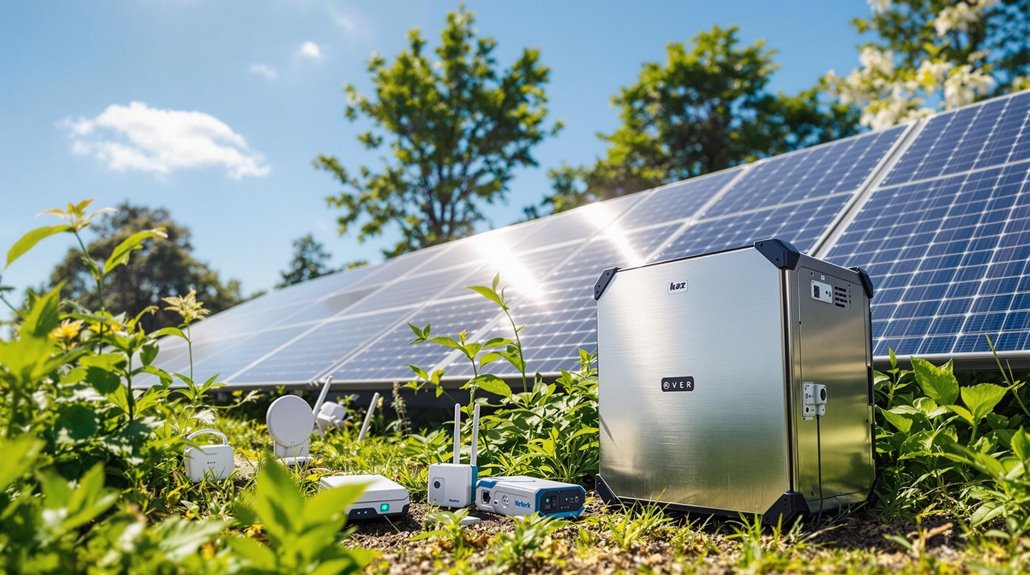
When you're off the grid, reliable battery and solar solutions are vital for staying connected. Opt for lithium-ion batteries due to their high energy density, fast charging, and extended lifespan of up to 15 years. Pair them with portable solar panels from brands like EcoFlow or Goal Zero for efficient charging. These panels are lightweight and can quickly recharge your devices. Consider power stations like the Goal Zero Yeti for extended power supply, allowing days of uninterrupted use. Properly integrating and evaluating your solar setup guarantees seamless, efficient off-grid communication. Find out which solutions fit your needs best.
Understanding Off-Grid Solar Batteries
Grasping the fundamentals of off-grid solar batteries empowers you to make informed decisions about energy storage solutions. Off-grid solar batteries are vital for storing energy generated from solar panels, ensuring you have power during nighttime or cloudy days. Lithium-ion batteries stand out in this domain due to their high energy density, fast charging, and impressive lifespan of 10-15 years, providing reliable power for your solar power system. The importance of regular testing is emphasized in the maintenance of these systems to ensure reliability and safety compliance. When evaluating energy storage, it's imperative to assess your energy needs. A typical lithium-ion battery has a capacity of around 10kWh. Depending on your daily consumption, which for a US household averages 30kWh, you might need multiple units to meet your energy demands. Capacity options allow you to tailor your setup, but it's also significant to contemplate the depth of discharge (DoD). Maintaining a DoD below 100% optimizes battery health and lifespan, ensuring consistent power output. Off-grid solar batteries are an investment, with costs ranging from $6,100 to $16,000, plus installation fees. By understanding these factors, you can effectively plan for both immediate and backup power needs, making your solar power system a sustainable and dependable energy solution.
Types of Off-Grid Batteries
When considering types of off-grid batteries, you'll often find that lithium-ion batteries take the lead in popularity. These batteries are the go-to choice for many off-grid systems because of their high energy density, compact design, and impressive battery life spanning 10-15 years. Their ability to achieve up to 95% energy efficiency makes them ideal for harnessing solar energy and storing energy effectively. In contrast, lead-acid batteries, though more affordable, lag with lower energy density and shorter lifespan of 5-10 years. While they offer a viable alternative for those on a budget, their limited battery capacity and efficiency make them less suitable for extensive use in off-grid systems. For larger scale needs, flow batteries present an option with substantial battery capacity, perfect for industrial applications. However, their complexity and cost often surpass typical residential requirements. Finally, nickel-cadmium batteries are durable and perform well under harsh conditions, but their environmental impact and toxicity have led to their decline in modern off-grid setups. To enhance the sustainability of off-grid systems, incorporating rechargeable flashlights can reduce battery waste and support eco-friendly practices. As you investigate your options, consider the specific demands and constraints of your off-grid communication devices to select the most fitting battery technology.
Cost of Solar Battery Solutions
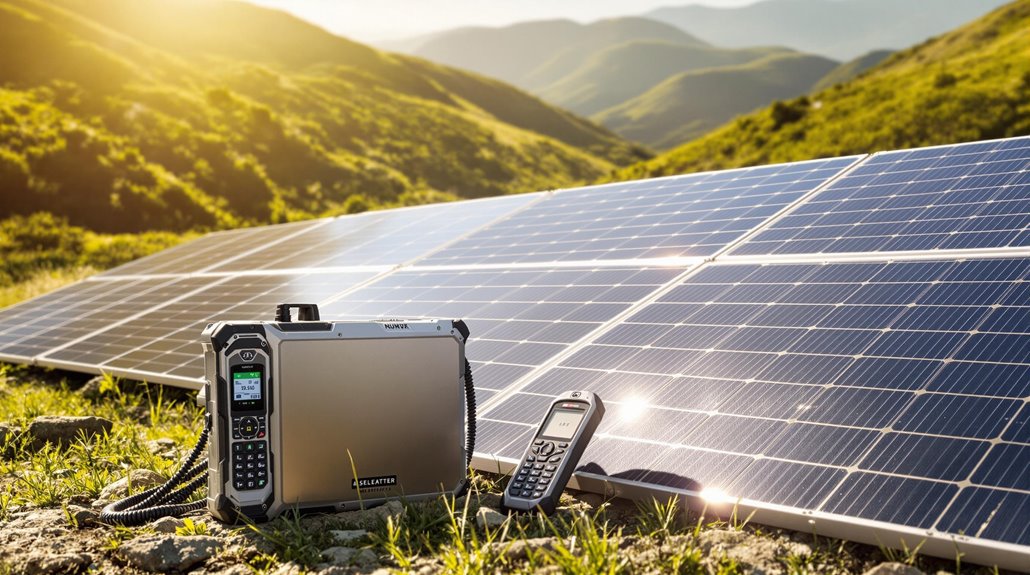
Exploring the cost of solar battery solutions reveals a wide range of prices based on several factors. The typical cost of home solar battery systems ranges from $6,100 to $16,000, primarily influenced by the type and brand of solar batteries you choose. Installation fees can add another $3,000 to $4,000 to your initial investment. If you opt for a smaller system, say 8kWh or less, expect the price tag to be under $10,000 before installation. Larger systems, however, can exceed $60,000, particularly if you're looking for extensive home battery backup.
When considering the cost of solar battery solutions, affordable lead-acid options start around $6,150, making them a budget-friendly choice. On the other hand, advanced lithium-ion batteries can surpass $16,000, but they often offer better performance and longevity. The average price per kilowatt-hour (kWh) of energy storage is between $1,000 to $2,000, which greatly impacts the total cost depending on your chosen system size.
Comparative research is essential, as pricing transparency varies, and performance can differ across technologies. By thoroughly researching and comparing brands, you can find the most cost-effective solution for your energy storage needs.
Battery Performance Metrics
Understanding battery performance metrics is vital when evaluating the efficiency of solar battery systems for off-grid communication devices. You'll want to focus on several key factors to guarantee your system meets your needs. Round-trip efficiency is a significant metric, with solar batteries typically achieving between 90% and 96.5%. This tells you how much stored energy you can effectively use.
Depth of discharge (DoD) is another key consideration. To prolong battery lifespan, aim for a DoD below 100%. Many lithium batteries can handle up to 90% DoD without significant degradation, making them a reliable choice. Power output ratings, measured in kilowatts (kW), determine if the battery can meet peak and continuous energy demands, especially in high-capacity power situations.
Warranty periods and cycle warranties give insights into long-term reliability. Most off-grid batteries offer warranties from 10 to 15 years and cycle warranties between 4,000 to 8,000 cycles. These metrics help gauge a battery's durability over time. Finally, consider the capacity, measured in kilowatt-hours (kWh). With standard household energy demands around 30kWh daily, selecting the right battery size is vital to guarantee your communication devices remain powered off-grid. A reliable power supply is critical for ensuring continuous operation, particularly in emergency scenarios requiring sustained communication.
Planning Your Off-Grid System
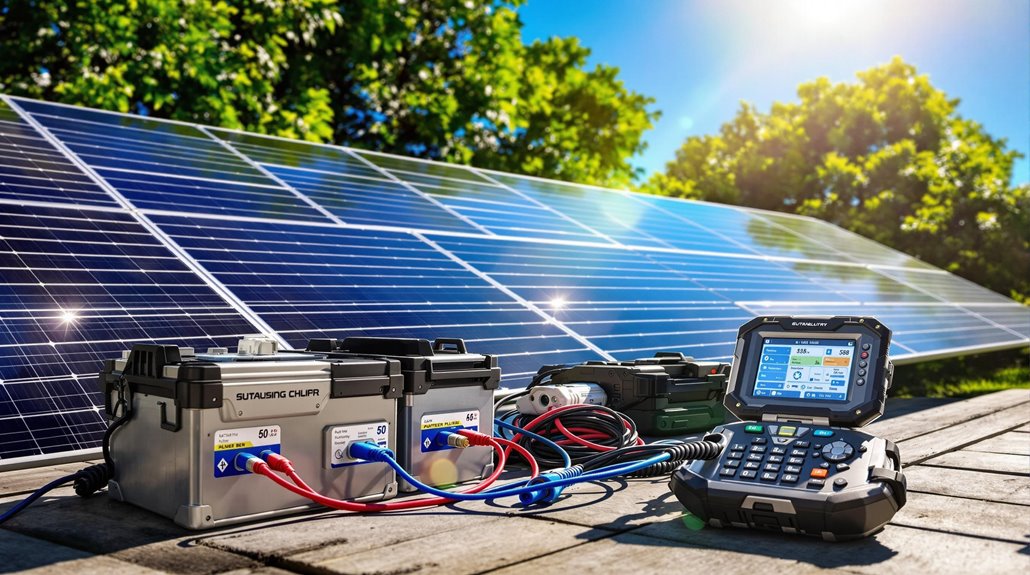
Getting started on planning your off-grid system can feel overwhelming, but breaking it down into manageable steps simplifies the process. Initially, assess your daily energy consumption. Calculate the total wattage of all devices you plan to use off-grid. This helps determine the required battery capacity and the size of your solar panels. It's essential to evaluate your geographical location and solar exposure to optimize solar panel placement for maximum sunlight capture throughout the day. Consider using lithium-ion batteries for their high round-trip efficiency of 92% to 98% and faster charging times, which improve your off-grid power setup. A modular solar system is a smart choice because it allows easy expansion as your energy needs grow. This flexibility guarantees you can add more batteries or solar panels when necessary. For survival situations, a filter micron rating is crucial to consider when choosing suitable water filtration systems. Consult with solar professionals to confirm proper system sizing and integration. They can help identify the best inverter and charge controller for your specific requirements. Remember, these components are critical for efficiently converting and storing solar energy. By following these steps, you'll create a reliable off-grid system tailored to your communication device needs.
Choosing the Best Solar Batteries
Selecting the best solar batteries for your off-grid communication devices is essential to guarantee reliable and efficient power. When considering options, lithium-ion solar batteries stand out due to their high energy density and impressive longevity, often lasting 10 to 15 years. This makes them ideal for maintaining off-grid power to your communication devices in remote areas. Compared to lead-acid batteries, which have a shorter lifespan and lower energy density, lithium-ion batteries provide more dependable backup power. You should also evaluate the capacity of the batteries. Standard lithium batteries typically offer around 10 kWh, so you might need several units to meet your energy needs, especially if you're powering high-output devices. Don't overlook round-trip efficiency either; lithium-ion batteries usually boast efficiency ratings between 85% and 95%, guaranteeing more stored energy is available when you need it. Charging speed and power output are significant too. Batteries with faster charging capabilities and higher output can better support your communication devices, allowing for uninterrupted use. It's crucial to store batteries in cool, dry places to ensure their longevity and prevent issues like leakage or corrosion. By selecting the right solar batteries, you guarantee your off-grid adventures remain seamless and your communication devices stay powered up and ready.
Essential Solar Gear for Devices
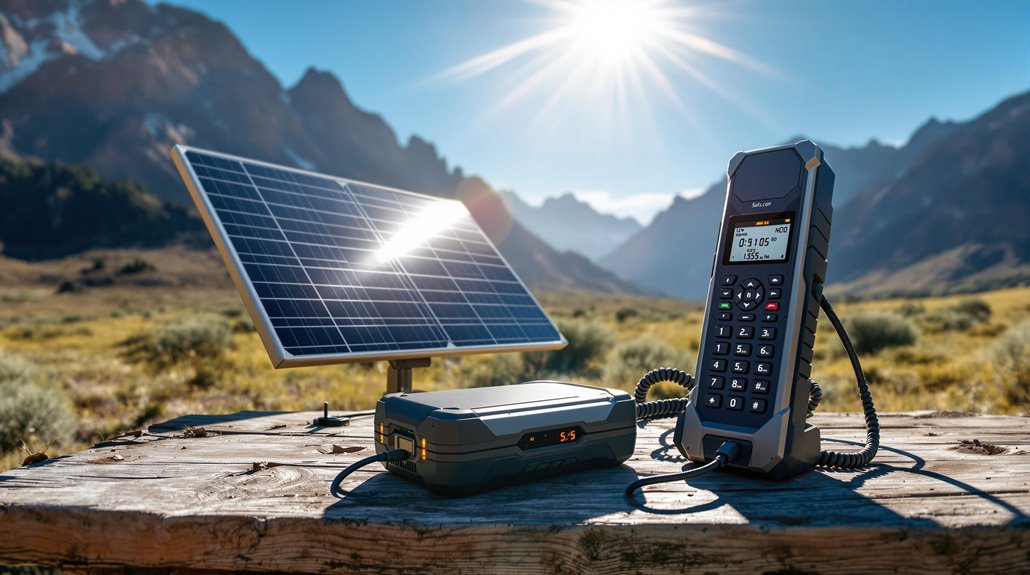
Beyond selecting the best solar batteries, outfitting your off-grid communication devices with the right solar gear guarantees they stay charged and ready wherever your adventures take you. Portable solar panels, like those from EcoFlow and Goal Zero, offer lightweight and efficient charging solutions. These panels harness solar charge effectively, making them perfect for remote locations. Goal Zero's Yeti power stations, such as the Yeti 1500X, provide versatile power options with a 1516 Wh capacity, and they can recharge in just 4-8 hours using solar panels, ensuring your devices remain operational. Solar-powered street lights exemplify urban integration of solar technology, providing sustainable lighting solutions that reduce reliance on non-renewable resources. For those who need more backup power, high-capacity options like the Goal Zero Yeti PRO 8000, with a whopping 7988 Wh, can keep your communication devices running for up to two days. This makes them ideal for extended off-grid adventures. Solar gear compatibility is essential for seamless integration; make sure your portable solar panels and battery systems have the necessary adapters to connect efficiently with your devices. Fast charging capabilities, especially in EcoFlow's solar solutions, greatly reduce downtime, ensuring your communication devices are always ready. With the right off-grid solar systems, you're never out of touch.



